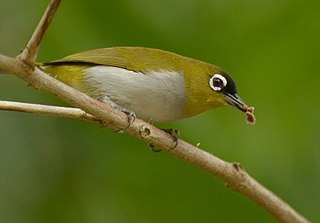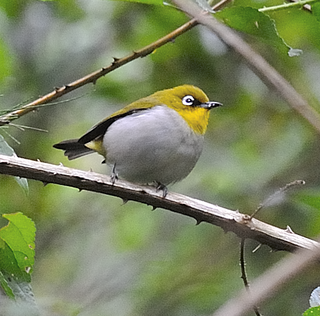
The white-eyed tody-tyrant is a species of bird in the family Tyrannidae, the tyrant flycatchers.
Sanford's white-eye is a species of bird in the family Zosteropidae. It is endemic to Nendo Island.

The black-ringed white-eye or lemon-throated white-eye is a species of bird in the family Zosteropidae. It is endemic to Sulawesi, Indonesia. Its natural habitat is subtropical or tropical moist lowland forests.

The cream-throated white-eye is a species of bird in the family Zosteropidae. It is endemic to the northern Moluccas.

The black-crowned white-eye is a songbird species. It is closely related to the Old World babblers, and its family Zosteropidae might better be included in the Tiimalidae. Its subspecies from the Sulawesi region might warrant recognition as distinct species Z. subatrifrons. The Sangihe white-eye and the Seram white-eye were formerly included in Z. atrifrons, as is still, on occasion, the black-fronted white-eye.
The Buru white-eye is a species of bird in the family Zosteropidae. It is endemic to Indonesian islands, including the island of Buru which gives its name. Its natural habitats are subtropical or tropical moist lowland forests and subtropical or tropical moist montane forests. The species occupy an area of larger than 20,000 km2 and is thought to have a stable population of above 10,000, and thus are not considered as threatened.

The ashy-bellied white-eye is a species of bird in the family Zosteropidae found in the Lesser Sunda Islands and northern Cape York Peninsula. It is sometimes called the pale white-eye or pale-bellied white-eye, but should not be confused with the pale-bellied white-eye.

The pale-bellied white-eye is a species of bird in the family Zosteropidae. It is endemic to SE Sulawesi in Indonesia. Its natural habitat is subtropical or tropical moist lowland forest. The species has a limited distribution and also appears to be sensitive to human disturbance.

Everett's white-eye is a bird species in the disputed family Zosteropidae, which might belong with the Old World babblers (Timaliidae). The name commemorates British colonial administrator and zoological collector Alfred Hart Everett.

The capped white-eye is a species of bird in the family Zosteropidae. It is found in New Guinea. Its natural habitat is in subtropical or tropical moist montane forests. It has a white eye ring, round wings, and strong legs. The capped white-eyes are sociable and live in large flocks. The Oya Tabu white-eye of the D'Entrecasteaux Islands was formerly considered a subspecies, but is now thought to be a distinct species.

The Louisiade white-eye or islet white-eye is a species of bird in the family Zosteropidae. It is endemic to Papua New Guinea.

The Malagasy white-eye is a species of bird in the white-eye family, Zosteropidae. Found in Madagascar and Seychelles, its natural habitats are subtropical or tropical dry forests, subtropical or tropical moist lowland forests, subtropical or tropical mangrove forests, and subtropical or tropical moist montane forests.

The Mayotte white-eye or chestnut-sided white-eye is a species of bird in the family Zosteropidae. It is now found only on Mayotte in the Comoro Islands. Its natural habitats are subtropical or tropical dry forests, subtropical or tropical moist lowland forests, and subtropical or tropical mangrove forests.

The Christmas white-eye is a species of bird in the family Zosteropidae. It is endemic to Christmas Island. Its natural habitats are tropical and subtropical moist broadleaf forests and subtropical or tropical moist shrubland. It is threatened by habitat destruction.

The Papuan white-eye, sometimes known as the New Guinea white-eye, is a species of bird in the family Zosteropidae. It is found in the Aru Islands and New Guinea. Its natural habitats are subtropical or tropical moist lowland forests and subtropical or tropical moist montane forests. The species was first classified in 1878, and has a conservation status of Least Concern.

Heuglin's white-eye, also known as the Ethiopian white-eye, is a species of bird in the family Zosteropidae. It is found in north-eastern and eastern Africa, primarily in Ethiopia and Kenya. Its natural habitats range from subtropical or tropical moist montane forests, to subtropical or tropical high-altitude shrubland, plantations, and rural gardens.
The Samoan white-eye is a species of bird in the family Zosteropidae. It is endemic to the island of Savai'i in Samoa.
The Vella Lavella white-eye, belted white-eye, or banded white-eye is a species of bird in the family Zosteropidae. It is endemic to the Solomon Islands.
John Henry Vaughan MC KC (Fiji) was a lawyer and ornithologist who served as Attorney General of Zanzibar and later as Attorney General of Fiji.
The Oya Tabu white-eye is a species of bird in the family Zosteropidae. It is native to the Fergusson and Goodenough islands. Its natural habitat is in subtropical or tropical moist montane forests. The Oya Tabu white-eye was formerly considered a subspecies of the capped white-eye.














